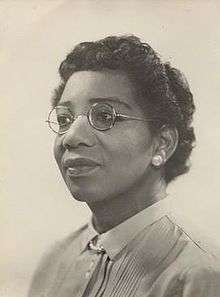Amy Barbour-James
Amy Barbour-James (25 January 1906 – 4 May 1988) was a British-born Guyanese Black civil rights activist and civil servant.
Amy Barbour-James | |
|---|---|
 Amy Barbour-James in the mid-1930s[1] | |
| Born | Caroline Amy Aileen Barbour-James 25 January 1906 |
| Died | 4 May 1988 (aged 82) Harrow, London |
| Known for | Civil rights activist |
Early life and family
Caroline Amy Aileen Barbour-James was born in Acton, London,[2] on 25 January 1906[3] to Guyanese parents, John and Caroline Barbour-James,[4] one of their eight children.[1] The Barbour-James family were a middle-class family who lived in west London in the early 20th century. Her father, John Barbour-James, worked as administrator in West Africa[2] and had access to a large network of contacts throughout the continent. In 1918, he founded the African Patriotic Intelligence Bureau.
Activism
Inspired by her father, Barbour-James became active in the civil rights movements and was involved in the African Progress Union and the League of Coloured Peoples, becoming secretary of the latter organisation in 1942.
In 2011, a short drama based on Barbour-James's life was broadcast by BBC Radio 4.[5]
Death
Barbour-James died in Harrow on 4 May 1988, aged 82.
References
- "Amy Barbour-James". National Portrait Gallery. Retrieved 14 February 2016.
- "005: Amy Barbour-James & the League of Coloured Peoples 1942 « Jeffrey Green. Historian". Jeffreygreen.co.uk. Retrieved 15 February 2016.
- Green, Jeffrey (1998). Black Edwardians: Black People in Britain, 1901–1914. London [u.a.]: Frank Cass. p. 71. ISBN 0714644269.
- "Photograph of Amy Barbour-James: About the object". Teaching History with 100 Objects. The British Museum. Retrieved 13 February 2016.
- "Writing the Century 11: 1963–1966 - All My Trials, Episode 1, Excerpt from: All My Trials". 15 Minute Drama. BBC Radio 4. Retrieved 2016-02-15.